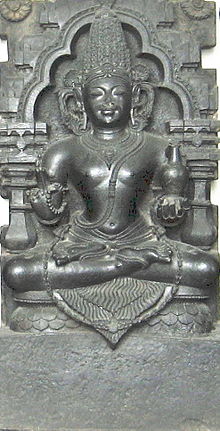Budha
Budha ( Sanskrit बुध budha m. , Literally "sage") is a personification of the planet of the same name Budha, which corresponds to Mercury , in Hinduism . In traditional Indian astronomy, it belongs to the Navagrahas , the nine planets , which are of importance in the life of faith as well as in Indian astrology . His name should not be confused with the Buddha , the founder of Buddhism .
family
Budha is the son of the moon god Chandra and Tara ("star"). His father kidnapped Tara, the wife of Brihaspati ("Jupiter"), which led to a war between the gods. Brahma settled the dispute and decided that Tara should be brought back to Brihaspati. When she gave birth to a boy, Brihaspati and Chandra claimed paternity. The argument threatened to break out again, until Tara, on the orders of Brahma, declared that Chandra was the father of the child, who was called Budha.
Budha married Ida , the daughter of Manu Vaivasvata and both had a son Pururavas , who married the Apsaras Urvashi . The lunar dynasty (Chandravamsha) descends from him, the most famous representatives of which are Krishna and Arjuna .
Budha is also considered to be the author of several hymns in the Rig Veda .
literature
- Budha . In: John Dowson : A classical dictionary of Hindu mythology and religion, geography, history, and literature. Trübner & co., London 1879, pp. 64-65 ( Text Archive - Internet Archive ).
Individual evidence
- ↑ budha . In: Monier Monier-Williams : Sanskrit-English Dictionary . Clarendon Press, Oxford 1899, p. 734, col. 1 .
